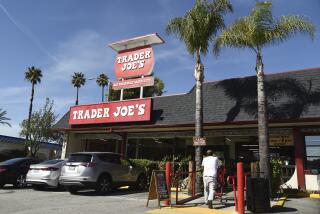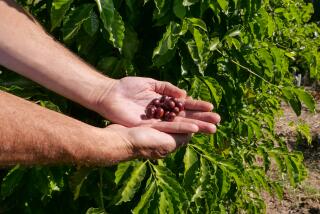Oddly, soaring coffee prices may hurt peasant growers
Soaring coffee prices mean good times for peasant growers, but because financial speculation in part is fueling the prices, the high prices eventually could threaten suppliers of organic and other “socially conscious” coffees.
U.S. retail coffee prices have risen more than 20% over the past 12 months and more than 57% in commodity markets. It’s a windfall for growers after nearly a decade of horrible prices.
“We haven’t seen this kind of price in many, many years,” said Linbano Cruz Alvarado, an organic grower who belongs to Union Majomut in Mexico’s mountainous southern state of Chiapas. “We’ve seen high prices, but not this high.”
But for counterintuitive reasons, these prices may be harmful.
Over the last 15 years, there’s been an explosion of specialty growers, whose exports include coffee beans grown without fertilizers and chemicals, and coffee grown in wild-bird sanctuaries. Coffee shops that offer these sorts of specialty coffee beans are now in virtually every large U.S. and European city.
Many specialty growers are in Latin America, where the coffee belt stretches from Mexico to Andean highland countries Peru and Bolivia. In recent decades, small coffee farmers in the Americas organized themselves into cooperatives, aided by U.S. and European nonprofit groups.
The co-op model — sometimes called the Fair Trade model because growers are collective owners who reap the full benefits — allowed farmers to earn above-market prices during down times. They were less vulnerable to the middlemen, called coyotes, who supply big international coffee companies.
Now, however, the coyotes offer better prices than some of the contracts the co-ops entered into previously with foreign buyers. Some farmers are taking the higher offers, leaving the co-ops struggling to get sufficient supplies and at risk of defaulting on contracts.
“The co-ops are an underfinanced population. If they needed $1 million before to buy the harvest of their members, suddenly they need $3 million” to compete with the middlemen and pay current prices, said Rodney North, a spokesman for Massachusetts-based Equal Exchange.
Equal Exchange has imported organic and Fair Trade coffee, grown by worker-owned co-ops, since 1986. North thinks that supply-and-demand fundamentals warrant higher coffee prices, but he fears that financial speculation is driving prices to levels that allow middlemen to undermine the Fair Trade business model.
It’s a concern shared by Santiago Paz Lopez, a co-manager of Co-op NorAndino in the north Peruvian town of Piura.
“A cooperative, its role is much bigger than just buying and selling. It is a rural development organization,” he said, noting that the cooperative’s profits help pay for roads, medical offices, schools and other needs that often aren’t met in developing nations.
His co-op of roughly 7,000 peasant farmers is holding together, but Paz Lopez has heard from others who aren’t faring as well.
“If the cooperatives end up breaking up, we go back to where we were, where the big companies have a large control over price, and they pay producers whatever they want,” he said. “That’s the threat.”
Hall writes for McClatchy.com






